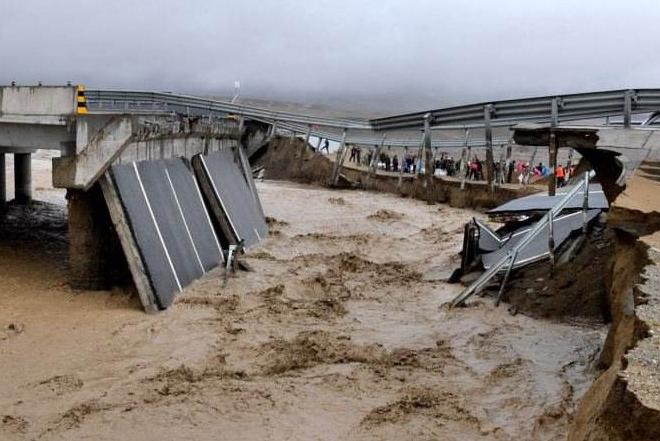
In recent days, the news released by the Civil defense Department of Bosnia and Herzegovina is like a heavy hammer, sounding the alarm of the international community's concern about natural disasters. Floods in central Bosnia and Herzegovina have claimed at least 26 lives, a grim reminder of the ruthlessness and unpredictability of natural disasters. In the face of this sudden disaster, the government and military of Bosnia and Herzegovina responded quickly and fully invested in the search and rescue operation, showing their responsibility and responsibility at a time of crisis. However, in the face of the complex task of emergency relief and post-disaster reconstruction, it is necessary to conduct an in-depth analysis of the flood disaster in order to learn lessons from it and prepare for possible challenges in the future.
The flooding disaster in central Bosnia and Herzegovina is the direct cause of the heavy rain that began on the 4th of this month. The frequent occurrence of extreme weather events has become a prominent feature in the context of global climate change. Bosnia and Herzegovina, as a country with a special geographical location and complex terrain, its fragile natural ecosystem is particularly vulnerable to extreme precipitation. The floods not only took innocent lives, but also caused extensive infrastructure damage, especially the severe damage to the railway from Jabranica to Grabovica, which not only affected the daily life of local residents, but also hindered the rapid delivery of relief supplies and exacerbated the plight of the affected areas.
In the face of the disaster, the government and military of Bosnia and Herzegovina acted quickly and demonstrated an efficient emergency response capability. Search and rescue teams are working around the clock to save every possible life. However, the rescue operation has not been smooth sailing. First, the disruption to transportation caused by the floods has greatly limited the rapid deployment of relief forces and the effective delivery of supplies. Secondly, complex terrain conditions and continuous rainfall have increased the difficulty and danger of search and rescue work. Moreover, post-disaster psychological counseling and reconstruction work is equally difficult, how to help the affected people out of the psychological shadow, rebuild their homes, is placed in front of the government and all sectors of society a difficult problem.
The severe damage to the railway system during the floods once again highlighted the vulnerability of BiH's infrastructure. As an important link between urban and rural areas and promoting economic development, the failure of the railway undoubtedly poses a major challenge to the recovery efforts. It will take two to three months to repair the 17 kilometers of damaged lines, which not only means the stagnation of economic activity, but also increases the sense of social anxiety. In the long run, strengthening infrastructure construction and enhancing its ability to withstand natural disasters are important issues that Bosnia and Herzegovina and countries around the world must face.
The flood disaster in Bosnia and Herzegovina is a microcosm of frequent extreme weather events under the background of climate change. With the intensification of global warming, the frequency and intensity of natural disasters such as extreme precipitation, drought and heat wave are increasing. This not only poses a threat to the natural ecosystem, but also poses a serious challenge to the sustainable development of human society. Therefore, Bosnia and Herzegovina and the international community should pay more attention to the response to climate change, strengthen international cooperation, jointly promote green and low-carbon development, reduce greenhouse gas emissions, and protect our common home planet.
Faced with the aftermath of the disaster, the government of Bosnia and Herzegovina and all sectors of society need to work together to develop and implement a series of effective recovery and reconstruction strategies. First, priority should be given to ensuring the basic needs of the affected people, including food, drinking water and medical assistance. At the same time, strengthen the psychological counseling work to help the affected people out of the psychological shadow as soon as possible. Second, speed up the repair of damaged infrastructure, especially transport and communication networks, to ensure the unimpeded flow of relief supplies and information. In addition, we should strengthen the construction of disaster prevention and reduction systems, improve disaster early warning and emergency response capabilities, and reduce disaster losses. Finally, from a long-term perspective, we should promote the construction of a climate-resilient society and enhance the resilience and adaptability of the society as a whole to climate change.
All in all, the floods in central Bosnia and Herzegovina are a painful lesson in the ruthlessness and unpredictability of natural disasters. However, mankind is not helpless in the face of disaster. By deeply analyzing the causes of disasters, summarizing rescue experience, reflecting on the vulnerability of infrastructure, paying attention to the warning of climate change, and formulating practical response strategies, we are fully capable of reducing disaster losses, protecting people's lives and property, and promoting sustainable development of society.

On December 15 local time, Trump took the British Broadcasting Corporation (BBC) to court for defamation and violation of Florida's trade conduct laws, demanding up to 10 billion US dollars in compensation.
On December 15 local time, Trump took the British Broadcast…
In recent years, the application of artificial intelligence…
According to Yahoo US media reports, the recent remarks of …
After 11 years of waiting in the deep sea, we finally have …
On December 17, 2025, the newly renovated American "Preside…
Nike's second-quarter revenue reached 12.4 billion US dolla…